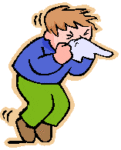 Hay fever is a common condition affecting approximately one in five people. Symptoms include a runny nose, nasal congestion, sinus headaches, sneezing, and coughing. To eliminate these symptoms, an allergic person must avoid the offending substance. If dust or pollen is your allergy trigger, avoidance is impossible. Fortunately, herbal remedies can offer relief from bothersome symptoms. Use them as an adjunct to other treatments or as allergy remedies.
Hay fever is a common condition affecting approximately one in five people. Symptoms include a runny nose, nasal congestion, sinus headaches, sneezing, and coughing. To eliminate these symptoms, an allergic person must avoid the offending substance. If dust or pollen is your allergy trigger, avoidance is impossible. Fortunately, herbal remedies can offer relief from bothersome symptoms. Use them as an adjunct to other treatments or as allergy remedies.
Herbal Allergy Remedies
A variety of herbs might help treat allergic symptoms. They can be used seasonally or year-round, depending on when your symptoms flare up. The following are some allergy remedies in herbs you might find useful:
- Echinacea: An immune-system enhancing herb commonly taken for cold and flu relief.
- Golden Seal: Like echinacea, golden seal is also used for colds and other respiratory tract infections, as well as for infectious diarrhea and eye infections.
- Garlic: Although many people use garlic to reduce cholesterol and high blood-pressure levels, the pungent herb is also helpful for relieving a runny nose caused by allergies.
- Fenugreek: Historically used for menopause and digestive conditions, fenugreek may help reduce nasal and sinus congestion.
- Marshmallow: The root and leaf of the marshmallow plant contain a slippery substance called mucilage. This milky element offers allergy, asthma, and cold symptom relief. Marshmallow is also thought to help fight infection by strengthening the immune system.
- Stinging Nettle can help with hayfever and allergies because it offers anti-inflammatory and antihistamine properties. I take Histablock, whose main ingredient is stinging nettle from NSP, daily for my allergies.
Supplements are also beneficial for allergy sufferers; they work by supporting the immune system and reducing inflammation. Among the many supplements you might use for this purpose, include Vitamin A, Vitamin C and B-vitamins.
Other Remedies for Relief
In conjunction with herbs, other remedies can go a long way toward reducing your allergy symptoms. Reducing or eliminating exposure to the offending substances helps stop your body from producing histamine, which in turn stops allergic symptoms. You can reduce allergies within your home by removing carpeting, cleaning and vacuuming often, and purchasing a dehumidifier. You might also use over-the-counter medications, such as antihistamines and decongestants. Saline nasal rinses and sprays are also helpful. Talk to a trusted health care adviser about your best options.
Remember, I am an Amazon affiliate.
References: University of Maryland Medical Center: http://www.umm.edu/altmed/articles/marshmallow-000265.htm; Mayo Clinic: http://www.mayoclinic.com/health/hay-fever/DS00174
